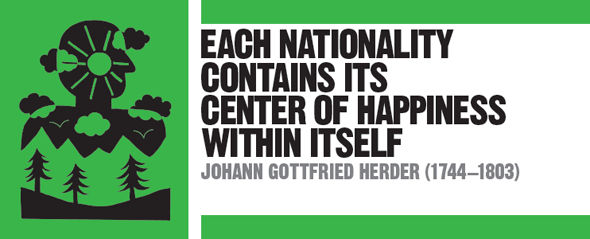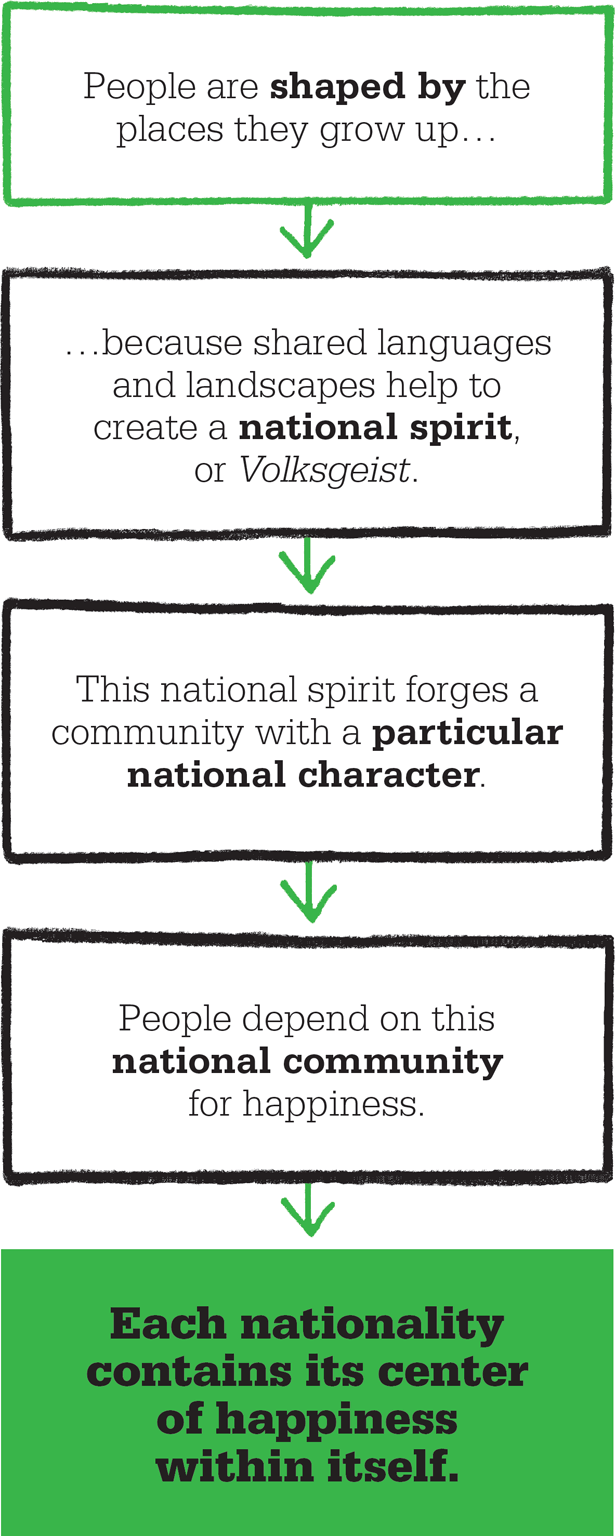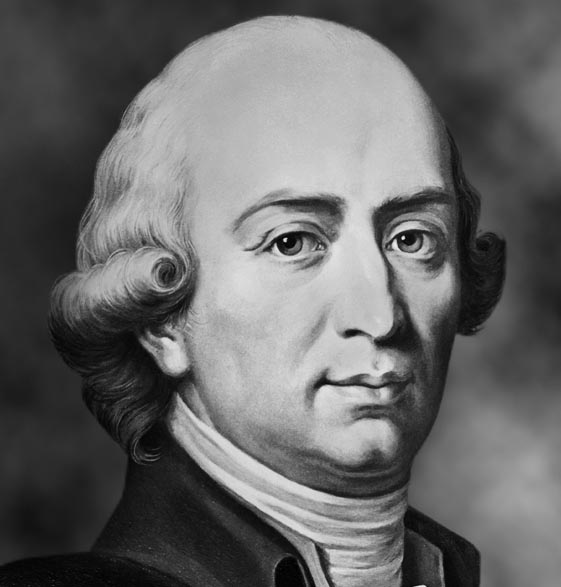
IN CONTEXT
Nationalism
Cultural identity
98 CE The Roman senator and historian Tacitus hails German virtues in Germania.
1748 Montesquieu argues that national character and the nature of a government are reflections of climate.
1808 German philosopher Johann Fichte develops the concept of the Volk or “people” in the movement for Romantic Nationalism.
1867 Karl Marx criticizes nationalism as a “false consciousness” that prevents people from realizing they deserve better.
1925 Adolf Hitler champions the racial supremacy of the German nation in Mein Kampf.
In 18th-century Europe, Enlightenment philosophers tried to show how the light of reason could lead the human race out of superstition. Johann Herder, however, believed that a search for universal truths based solely on reason was flawed, since it neglected the fact that human nature varies according to cultural and physical environments. People need a sense of belonging, and their outlook is shaped by the places they grow up in.

National spirit
Herder argued that language is crucial in forming a sense of self, and so the natural grouping for humanity is the nation—not necessarily the state, but the cultural nation with its shared language, customs, and folk-memory. He believed that a community is forged by a national spirit—the Volksgeist—which emerges from language and reflects the physical character of the homeland. He saw nature and the landscape as nurturing and supporting the people, binding them with their national character.
People depend on this national community for happiness. “Each nation has its center of happiness within itself,” Herder asserts, “just as every sphere has its own center of gravity.” If people are taken out of their national environment, they lose contact with this center of gravity and are deprived of this natural happiness. Herder was not only concerned about emigration, but also immigration, which he believed upset the organic unity of national culture—the only true basis of government. “Nothing is more manifestly contrary to the purpose of political government than the unnatural enlargement of states, the mixing of various races and nationalities under one scepter.” Herder was referring to the perils of colonialism and empire building, but his ideas can be related to modern multiculturalism.
Rising nationalism
Herder’s ideas were an inspiration for the rising tide of Romantic nationalism that swept through Europe in the 19th century as a range of peoples—from the Greeks to the Belgians—asserted their nationhood and self-determination. But national or racial superiority was often assumed, culminating in the German persecution of the Jews, and in “ethnic cleansing.” Although the Holocaust cannot be laid directly at Herder’s door, he did state that Jews are “alien to this part of the world [Germany].”
"It is nature that educates people: the most natural state is therefore one nation, an extended family with one national character."
Johann Gottfried Herder
Herder’s idea of a national center of gravity also ignores the diversity of views and cultures within each nation, and leads to national stereotyping. His emphasis on national culture neglects other influences—such as economics, politics, and social contacts with different people—making his views less credible in the modern, globalized world. Arguably, he overestimated the prominence of nationality in people’s priorities, which can be swayed by anything from family ties to religious views.

Nationalism as championed by Herder became an important part of the Nazi party’s ideology. This travel brochure from 1938 depicts an Aryan couple enjoying traditional folk dancing.
JOHANN GOTTFRIED HERDER

Herder was born in Mohrungen in Prussia (now Morag in Poland) in 1744. At 17, he studied under Kant and was mentored by Johan Hamann at the University of Königsberg. After graduation, he taught in Riga before traveling to Paris and then Strasbourg, where he met the writer Goethe, on whom he had a profound influence. The German Romantic literary movement led by Goethe was inspired partly by Herder’s claim that poets are the creators of nations. Goethe’s influence gained Herder a post at the court of Weimar, where he developed his ideas of language, nationality, and people’s response to the world. He began to collect folk songs capturing the Volksgeist—the “spirit”—of the German people. Herder was made a noble by the elector-prince of Bavaria and so was able to call himself “von” Herder. He died in Weimar in 1803.
Key works
1772 Treatise on the Origin of Language
1773 Voices of the People in their Songs
See also: Montesquieu • Guissepe Mazzini • Karl Marx • Friedrich Nietzsche • Theodor Herzl • Marcus Garvey • Adolf Hitler
